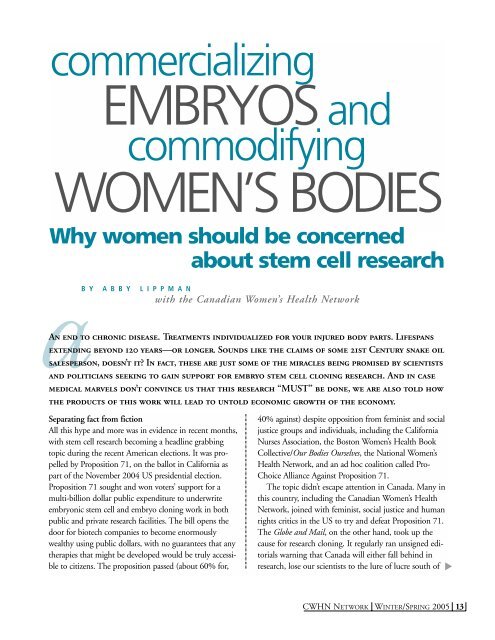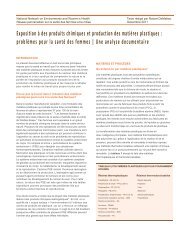NETWORK WIN00 - Canadian Women's Health Network
NETWORK WIN00 - Canadian Women's Health Network
NETWORK WIN00 - Canadian Women's Health Network
Create successful ePaper yourself
Turn your PDF publications into a flip-book with our unique Google optimized e-Paper software.
commercializing<br />
EMBRYOS and<br />
commodifying<br />
WOMEN’S BODIES<br />
Why women should be concerned<br />
about stem cell research<br />
B Y A B B Y L I P P M A N<br />
with the <strong>Canadian</strong> Women’s <strong>Health</strong> <strong>Network</strong><br />
aAn end to chronic disease. Treatments individualized for your injured body parts. Lifespans<br />
extending beyond 120 years—or longer. Sounds like the claims of some 21st Century snake oil<br />
salesperson, doesn’t it? In fact, these are just some of the miracles being promised by scientists<br />
and politicians seeking to gain support for embryo stem cell cloning research. And in case<br />
medical marvels don’t convince us that this research “MUST” be done, we are also told how<br />
the products of this work will lead to untold economic growth of the economy.<br />
Separating fact from fiction<br />
All this hype and more was in evidence in recent months,<br />
with stem cell research becoming a headline grabbing<br />
topic during the recent American elections. It was propelled<br />
by Proposition 71, on the ballot in California as<br />
part of the November 2004 US presidential election.<br />
Proposition 71 sought and won voters’ support for a<br />
multi-billion dollar public expenditure to underwrite<br />
embryonic stem cell and embryo cloning work in both<br />
public and private research facilities. The bill opens the<br />
door for biotech companies to become enormously<br />
wealthy using public dollars, with no guarantees that any<br />
therapies that might be developed would be truly accessible<br />
to citizens. The proposition passed (about 60% for,<br />
40% against) despite opposition from feminist and social<br />
justice groups and individuals, including the California<br />
Nurses Association, the Boston Women’s <strong>Health</strong> Book<br />
Collective/Our Bodies Ourselves, the National Women’s<br />
<strong>Health</strong> <strong>Network</strong>, and an ad hoc coalition called Pro-<br />
Choice Alliance Against Proposition 71.<br />
The topic didn’t escape attention in Canada. Many in<br />
this country, including the <strong>Canadian</strong> Women’s <strong>Health</strong><br />
<strong>Network</strong>, joined with feminist, social justice and human<br />
rights critics in the US to try and defeat Proposition 71.<br />
The Globe and Mail, on the other hand, took up the<br />
cause for research cloning. It regularly ran unsigned editorials<br />
warning that Canada will either fall behind in<br />
research, lose our scientists to the lure of lucre south of<br />
▲<br />
CWHN <strong>NETWORK</strong> WINTER/SPRING 2005 13















